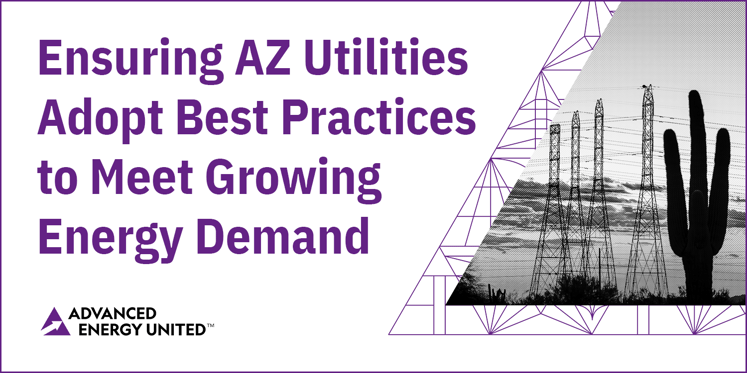
Every three years, Arizona Public Service (APS) and Tucson Electric Power (TEP) conduct a comprehensive study predicting the amount of energy their customers will need in order to determine the energy resources required to meet those needs. This study, known as an Integrated Resource Plan (IRP), is a common exercise that utilities undertake in many states. While different parts of the country have different electricity needs and varying resources available, we at Advanced Energy United (United) believe all IRPs should include a comprehensive assessment of the advanced energy resources available, a competitive procurement process, and full incorporation of any additional policies that will change resource needs or costs.
APS and TEP most recently filed IRPs that propose to add 6,000MW (APS) and 1,520MW (TEP) of renewable energy and battery storage. However, the APS IRP also proposes about 1,800MW of added natural gas, while the TEP IRP proposes adding 400MW of gas by 2028. As Arizona’s population continues to grow and as manufacturing and other industries expand in the state, customers are naturally using more electricity, and it is essential to ensure Arizona utilities can continue to meet demand sustainably, reliably, and affordably.
A recent RMI study commissioned by United, AriSEIA, and Vote Solar examined how Arizona utilities are currently tackling resource planning. The findings highlighted ways the utilities could rethink their approach to resource planning and improve future IRPs, ultimately making better resource investment decisions for customers.
Based on the study, United, AriSEIA, and Vote Solar filed joint comments at the end of January with recommendations to improve resource planning for advanced energy, which will benefit Arizona ratepayers and help businesses thrive in the state.
Our recommendations are as follows:
Prioritize advanced energy
First and foremost, APS and TEP must prioritize advanced energy in their resource planning. While large-scale solar, wind, and storage are a critical part of the resource mix, distributed energy resources (DERs), such as distributed solar and battery storage or demand response, play a pivotal role on a clean, reliable, and affordable grid. Utilities can invest more efficiently in new large-scale energy infrastructure if they fully incorporate DERs into IRP planning and properly value their unique benefits to the grid.
Continue competitive procurement processes
We applaud the utilities in their efforts to transition to clean energy. A key piece to achieving this is through competitive procurement processes. A predictable and fair all-source procurement process makes Arizona an attractive place to develop advanced energy resources and ensures that utilities are choosing the most affordable options to meet demand. Our comments commend APS and TEP on their current procurement processes and encourage them to continue to improve them, which we are confident will continue to result in additional opportunities to invest in low-cost advanced energy resources.
Utilize the Inflation Reduction Act (IRA)
The Inflation Reduction Act (IRA) presents an unparalleled opportunity for APS and TEP to finance their transition towards clean energy. In addition to tax credits that lower the cost of all renewable energy and storage projects, the IRA provides additional economic incentives that can help support a just transition as Arizona’s coal plants retire, such as the Energy Communities Bonus Adder and low-cost financing options for transitioning existing energy infrastructure.
Plan for joining a regional market
Lastly, APS and TEP should continue evaluating the benefits that will come from joining a west-wide regional electricity market and incorporate this into their resource planning. A regional market will lower costs for ratepayers, create jobs, and increase grid reliability. We urge Arizona decision-makers and utilities to continue their involvement in regional conversations as western market pathways develop and prioritize maximizing the geographic area covered by the market.
By advocating for using best practices in resource planning, considering the full range of advanced energy resources, and leveraging federal support and the prospect of market participation, Arizona utilities can reduce electricity bills for ratepayers, improve reliability, and accelerate progress toward a sustainable energy future for Arizona. United will continue to work with its members to advocate for policies promoting advanced energy in Arizona and around the country.
For more detailed insights into the RMI assessment and specific recommendations for APS and TEP, read our joint comments with AriSEIA and Vote Solar filed before the Arizona Corporation Commission.